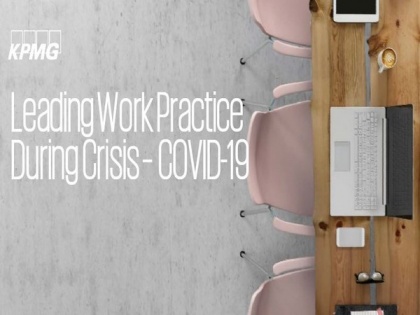Calamities like COVID-19 pose adverse impact to business continuity: KPMG
By ANI | Published: April 3, 2020 01:43 PM2020-04-03T13:43:19+5:302020-04-03T13:55:01+5:30
While businesses are learning to innovate and adapt to the ever-changing work environments, the pandemics and unforeseen calamities like COVID-19 pose an adverse impact to the business continuity, KPMG India said on Friday.

Calamities like COVID-19 pose adverse impact to business continuity: KPMG
New Delhi [India], April 3 : While businesses are learning to innovate and adapt to the ever-changing work environments, the pandemics and unforeseen calamities like COVID-19 pose an adverse impact to the business continuity, KPMG India said on Friday.
The rapid outbreak of the coronavirus presents an alarming health crisis that the world is grappling with. In addition to the human impact, orgsations and businesses are facing an unprecedented magnitude of economic difficulties due to this pandemic.
KPMG said orgsations need to understand their exposure to COVID-19, and more importantly, position their business to build a more resilient muscle and become agile in responding to this crisis.
As orgsations navigate the current environment and the shift towards a remote way of working where feasible, there are three broad aspects they need to keep in mind.
The first most important thing for orgsations during this crisis is to ensure connections between people remain strong. Leading by example and compassionate leadership are essential in this respect.
"Leaders and managers need to support people in dealing with the crisis without causing drastic disruption to business," it said in a report.
Secondly, navigating through business challenges due to COVID-19 is critical to mitigating the overall business risks. Orgsations need to assess, understand and address the unique risks they are bound to face, both at business and workforce front.
"Orgsations need to be pragmatic in their solutions, and yet be agile to re-evaluate and change their business strategies."
Thirdly, while orgsations are taking into account the health and safety of their employees, an employee is equally responsible to keep the business operational as far as possible by maximising the advantage and manage the challenges of working remotely.
"A true collaboration with its employees at each level is the key."
The report said orgsations need to approach their orgsational challengers in a pragmatic manner, yet focus on being agile. There is a need for all orgsations to reinvent themselves and identify how they will change and adapt to the scenarios, said the report.
At the same time, when working remotely or with limited capacity at the workplace, employees risk losing their sense of connectivity and team.
To mitigate the side-effects of alternate ways of working, said the report, leaders need to focus on implementing ways to keep workforce actively engaged.
( With inputs from ANI )
Open in app